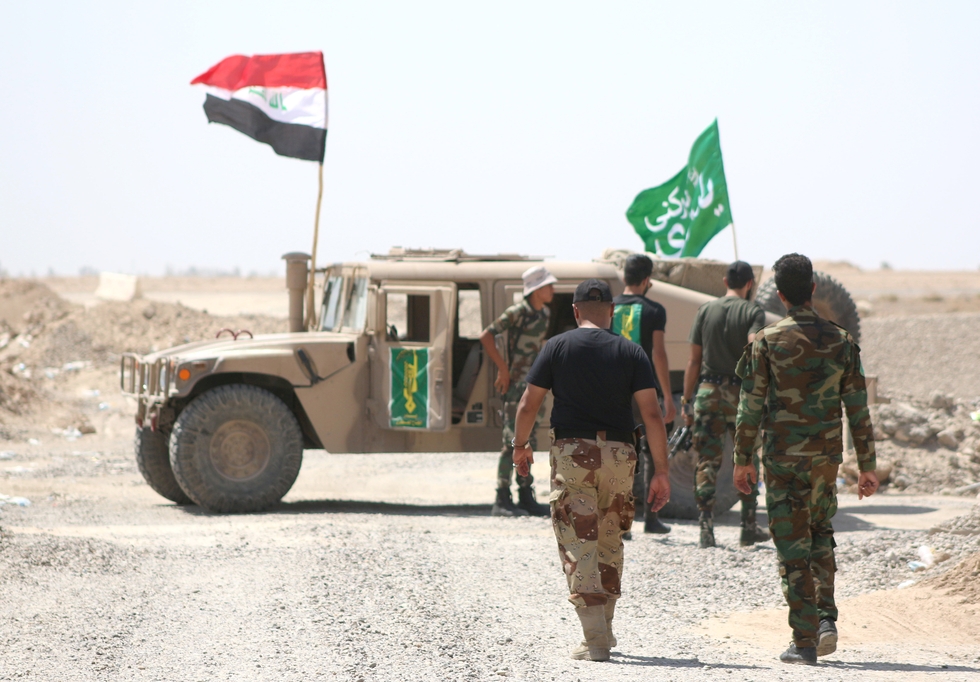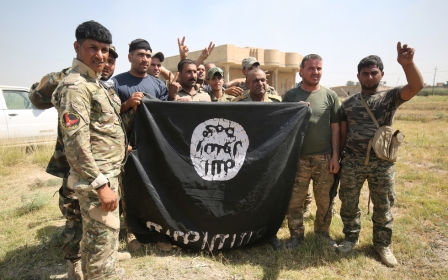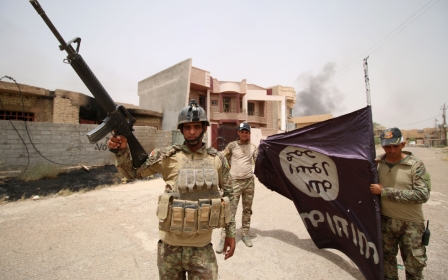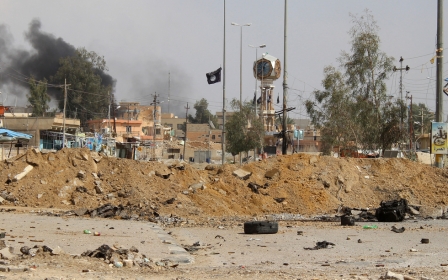Growing evidence of impunity over Iraq's disappeared Sunnis

For a brief moment last week, the world learned about the disappearance of at least 643 Iraqi civilians from Saqlawiya, and the torture and humiliation that awaited hundreds more captured by marauding, Iranian-backed militias.
Outrage was at best tame, and coverage has remained thin. Although government forces have recaptured Fallujah from Islamic State (IS), the fate of the “lost” men of Saqlawiya, Al-Garma and Al-Azraqiya remains unknown. Some were freed but only to have returned with bodies riddled with dark raised welts, inflicted by sectarian militias. It appears that no soundtrack other than a skulking silence accompanies these shameful developments, leaving many important questions unanswered.
Government officials have repeatedly said that investigations into alleged wrongdoing by its security forces are underway. Last Monday, government spokesman Sa'ad al-Hadithi affirmed that Haider al-Abadi's government is serious about pursuing violations against the people of Fallujah. Defence Minister Khaled al-Obaidi added that four military personnel had been arrested after video evidence of their abuses surfaced.
So why are the details of federal investigations yet to be made public? Why have those arrested not been quizzed on national TV, as is done with alleged IS members who are paraded before the cameras? Falah al-Fayadh, head of Iraq's Popular Mobilisation Units (PMUs) praised the umbrella organisation accused of human rights violations. He described the force as “the best thing Iraq has known” since 2003, and the latest allegations against them as “unfair”.
Al-Fayadh countered reports of sectarian driven crimes, arguing that “in the face of death our forces derive their strength from Islam, this is expected. We are Muslims...that does not make us sectarian. We are 'Husseiniyyoun' and Hussein is there in spirit in every fight". This is exactly the kind of sectarian-coloured rhetoric that will evoke further hatred, bigotry and make conciliation between Iraq's religious communities impossible.
The government has defended arbitrary arrests of local men on the grounds of mandatory security screenings. In the absence of external judicial supervision however, the procedure in many cases “degenerates into physical violations and other forms of abuse” to “elicit forced confessions”, as the UN High Commissioner for Human Rights, Zeid Ra'ad Al-Hussein, cautioned.
Without transparency there can be no intensive scrutiny of government findings. The worry, as echoed by Human Rights Watch’s senior researcher, Christoph Wilcke, is that investigations remain “shrouded in secrecy with no transparency whatsoever”.
The most important question is whether measures that can curb the spread of criminal behaviour by armed forces even exist. “Whether it is Iraqi criminal, civilian, or military law, crimes against humanity do not exist, which makes prosecution difficult” he added, demonstrating why this should be an area of concern for the anti-IS coalition if it truly desires a stable Iraq.
Since last week, hundreds of men have been held at Amiriyat al-Fallujah, at makeshift clinics, but journalists have been kept away. Wilcke told me that while 650 out of the missing 700 missing from Saqlawiya have reappeared, the “military came in and took away 20” for further screening.
Mahmoud Al-Naji, one of the select few men interviewed, describes the ill-treatment he was subjected to by PMU militias. The gaunt survivor told FRB news that one man started stamping on him with all his weight. “He broke my ribs, crushed my stomach, and pressed his boot hard against my neck. They beat us with heavy pipes.”
These survivor testimonies, in addition to documented abuses, expose the chilling scope of criminal activities perpetrated by Iranian-backed Shia militias, allied to and operating under the aegis of the PMUs. Methods used range from immolation, heavy beatings to sexual violence, but there no parliamentary debates about these gross violations have been held, in spite of their severity.
Some believe that militias fighting in and around Fallujah are intent on settling old scores against fleeing residents – in other words, holding innocents responsible for IS's barbarity. Video evidence shows militiamen lining-up Sunni men in a fashion reminiscent of the brutal 2014 Speicher massacre where IS executed a reported 1,700 Iraqi Army cadets. One of the men is heard saying "an eye for an eye and a tooth for a tooth", clearly indicating a lust for revenge against citizens of Fallujah for a crime they had nothing to do with. As the conflation of Iraq's Sunni community with IS becomes standard practice among PMU militias, government inaction only fuels war crimes against a defenceless population.
Still awaiting the return of their loved ones are the tribes of Albu Badran, Al-Bekkara and the Al-Mahamda. A lack of faith in the government’s current enquiries has driven tribes to conduct their own. Sheikh al-Jaleel from the Al-Bekkara tribe has been gathering testimonies from those who made it back alive, sharing some of his preliminary findings with me.
“Militia's entered the area on 4 June. With megaphones, the Badr Brigades and Asa'ib Ahl Al-Haq's henchmen ordered people to leave. Residents surrendered themselves. They separated the men from the women, assembling them in rows. Four earth diggers that [the Shia militias] brought began digging a ditch several metres deep. Everyone stood back bewildered. They blindfolded and handcuffed the men, before hurling charges of aiding IS their way. The first batch of people accused were thrown into the dugout trench, buried alive – 68 in total.”
In addition to harrowing allegations of mass burials that MEE has not been able to confirm, Sheikh Al-Jaleel relayed other obscenities carried out by militias. These included men being burned alive and summary executions at the Al-Mazra'a military base where many men were taken.
Currently unfolding is an all too familiar story. “This is not the first time in the government’s fight against ISIS that hundreds of men have disappeared,” Wilcke said. Dozens of men from Amerli, Al-Dour, Jurf Al-Sakhr, Ramadi and Tuz Khormatu have been reported missing in previous years, he added. No one today knows what happened to these men, after their "liberated" towns were seized by PMU militias. Now that Fallujah is back in the clutches of government forces, the war, as Sheikh Al-Jaleel warned "is far from over".
Despite abundant evidence of militias inflicting intentional harm upon innocent men fleeing areas around Fallujah, less clear as Wilcke’s says is “who will be investigated, what laws will be used, and what crimes will be looked into”. It is not even known whether the current investigative body looking into abuses is made up of individuals of independent standing, not directly appointed by the prime minister, or linked to political blocs or militia commanders. Protecting witnesses is another grey area that, until cleared up, will continue to feed fears of witness intimidation.
That the prime minister has called for investigations and claimed to have arrested several men is simply not good enough, given that similar efforts in the past have yielded no results as far as Sunnis are concerned. Families deserve to know the whereabouts of their loved ones, and to have them returned safely.
At a time when confidence in the government is at its lowest, inability to deliver justice to the families of victims only stirs greater fear and mistrust. Their whereabouts are still unknown, and yet the government seems to be in no mood to settle these unresolved matters. As Wilcke lamented, the narrative of “friend and foe” has triumphed against the narrative of “right and wrong”.
-Nazli Tarzi is an independent journalist, whose writings and films focus on Iraq's ancient history and contemporary political scene. You can follow her on Twitter @NazliTarzi
The views expressed in this article belong to the author and do not necessarily reflect the editorial policy of Middle East Eye.
Photo: Members of the Popular Mobilisation Units gather around a vehicle on the front line during a military operation against Islamic State (IS) group militants on the road leading to Saqlawiya, north of Fallujah, in Iraq's Anbar province on 19 August 2015. (AFP).
This article is available in French on Middle East Eye French edition.
Middle East Eye propose une couverture et une analyse indépendantes et incomparables du Moyen-Orient, de l’Afrique du Nord et d’autres régions du monde. Pour en savoir plus sur la reprise de ce contenu et les frais qui s’appliquent, veuillez remplir ce formulaire [en anglais]. Pour en savoir plus sur MEE, cliquez ici [en anglais].





